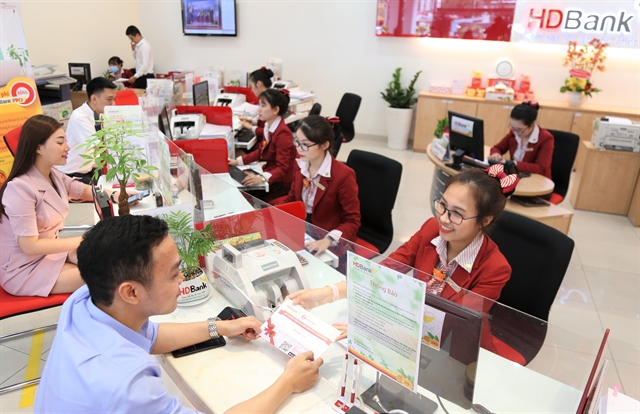 Economy
Economy


|
| An HDBank transaction office in HCM City. The bank remains on high growth path in Q3. — Photo courtesy of HDBank |
HCM CITY — The HCM City Development Joint Stock Commercial Bank (HDBank, HOSE: HDB) reported pre-tax profits of VNĐ3.615 trillion (US$155.5 million) for the first nine months of the year, a year-on-year increase of 31.9 per cent and equivalent to 107 per cent of the target.
Non-interest income grew by 158 per cent in the third quarter as the bank launched a number of programmes to help customers and others cope with the COVID-19 pandemic.
The total operating income of the parent bank for the quarter was VNĐ2.317 trillion ($99.65 million), up 21.4 per cent, with net interest income increasing by 25.6 per cent and fees from services by 158 per cent.
Profit before tax was VNĐ1.255 trillion ($540.8 million), up 24.9 per cent and consolidated pre-tax profit was worth VNĐ1.474 trillion ($63.5 million), up 19.1 per cent year-on-year.
The parent bank's profits for the first nine months rose 31.9 per cent to VNĐ3.615 trillion ($155.5 million), with net interest income and service fee income increasing by 31.1 per cent and 71.9 per cent.
Consolidated profits were up 27.1 per cent to VNĐ4.381 trillion ($188.46 million), equivalent to 103 per cent of its target.
Return on equity (ROE) and return on assets (ROA) were 21.1 per cent and 1.9 per cent.
The indicators of financial health were excellent. The capital adequacy ratio (CAR) was 10.9 per cent as against a minimum of 8 per cent prescribed under Basel II norms.
The ratio of short-term capital to medium- and long-term loans was only 23.7 per cent against a permitted cap of 40 per cent.
Credit rating agency Moody's recently ranked HDBank B1 even as the national credit rating was included in the monitoring category for a possible downgrade.
As of September 30 this year the bank’s total consolidated assets topped VNĐ273 trillion ($11.76billion), an increase of 19.1 per cent compared to the beginning of the year and an increase of 25.8 per cent from 12 months earlier.
Outstanding credit was at VNĐ175 trillion ($7.5 billion), an increase of 14.1 per cent over the year, 19.2 per cent higher than a year earlier and twice the banking industry’s average.
The above results were possible thanks to the bank enhancing credit programmes to support customers, embracing digitisation to improve efficiency and reduce costs and lowering lending interest rates while ensuring reasonable net profit margins.
Its ‘green credit’ programmes to promote high-tech agriculture, renewable energy, small and medium-sized enterprises, essential goods supply chains, and production and business households are welcomed by customers.
Along with outstanding loan portfolio growth, effective risk management has helped HDBank control asset quality with its bad debts ratio (separately) of 1.39 per cent being lower than the industry average.
HDBank has redeemed all its VAMC (Việt Nam Asset Management Company) bonds earlier than planned. It has also actively increased provisioning and is ready to deal with any risks that arise.
At the same time it has rolled out many services that are based on advanced technologies to offer customers more benefits on its mobile banking and internet banking platforms and to digitise its internal and transactions processes to become a paperless and digital bank.
It is the pioneer in implementing online customer identity verification (eKYC) and offering international payment solutions and trade finance on the blockchain platform using technology 4.0.
In 2020 the bank won a number of prestigious honours from international organisations such as the ‘Best Innovation in Green Banking’ and ‘Most Innovative Mobile Banking App’ awards from Global Business Outlook magazine, a place in Forbes magazine’s top 50 listed Vietnamese companies list and the ‘Mid-sized domestic retail bank’ prize from Asian Banking & Finance.
This is a pivotal year for HDBank in implementing its five-year development plan for 2016-21. The bank has always been consistent in its strategies of sustainable development, high growth, ensuring a return on equity of over 20 per cent, and developing digital banking.
The operating results that exceed the targets for the first nine months of 2020 will serve as a basis for the bank to achieve the targets for the whole year.
Recently it paid its first dividend for 2019 and issued bonus shares at a total rate of 30 per cent.
It is expected to pay a second dividend in the fourth quarter. — VNS




